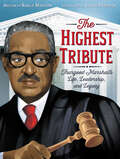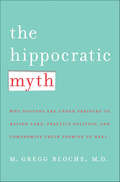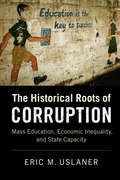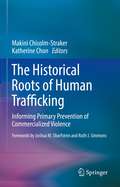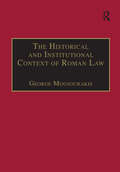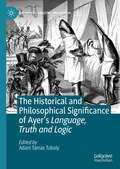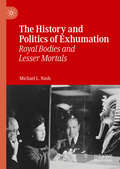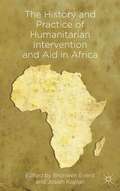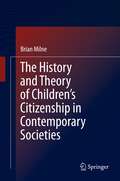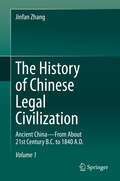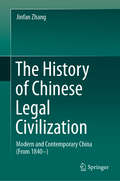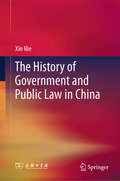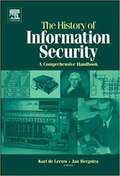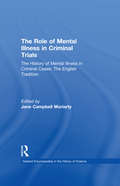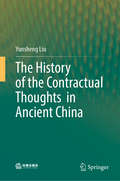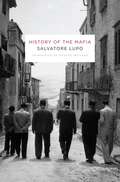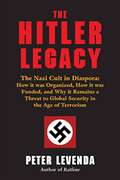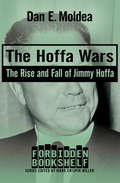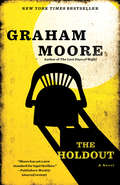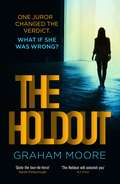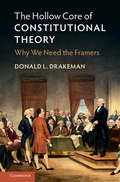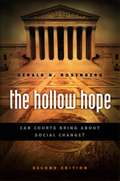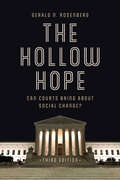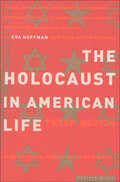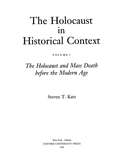- Table View
- List View
The Highest Tribute: Thurgood Marshall's Life, Leadership, and Legacy
by Kekla MagoonA brilliant picture book biography about Thurgood Marshall, who fought for equality during the Civil Rights Movement and served as the first Black justice on the Supreme Court, from Coretta Scott King Honor winners Kekla Magoon and Laura Freeman.Growing up in Baltimore, Thurgood Marshall could see that things weren’t fair. The laws said that Black and white people couldn’t use the same schools, parks, or water fountains.When Thurgood had to read the Constitution as punishment for a prank at school, his eyes were opened. It was clear to him that Jim Crow laws were wrong, and he was willing to do whatever it took to change them.His determination to make sure all Americans were treated equally led him to law school and then the NAACP, where he argued cases like Brown v. Board of Education in front of the Supreme Court. But to become a Justice on the highest court in the land, Thurgood had to make space for himself every step of the way.Readers will be inspired by Kekla Magoon’s concise text and Laura Freeman’s luminous illustrations, which bring Thurgood Marshall’s incredible legacy and achievements to life.* An SLJ Best Book of the Year * A Bank Street Best Book of the Year * A Jane Addams Children's Book Award Finalist * A Texas Topaz Nonfiction Selection * Wisconsin State Reading Association’s 2022 Picture This Recommendation List * Indiana Authors Award Shortlist *
The Hippocratic Myth: Why Doctors Are Under Pressure to Ration Care, Practice Politics, and Compromise Their Promise to Heal
by M. Gregg BlocheWhen we're ill, we trust in doctors to put our well-being first. But medicine's expanding capability and soaring costs are putting this promise at risk. Increasingly, society is calling upon physicians to limit care and to use their skills on behalf of health plan bureaucrats, public officials, national security, and courts of law. And doctors are answering this call. They're endangering patients, veiling moral choices behind the language of science and, at times, compromising our liberties. In The Hippocratic Myth, Dr. M. Gregg Bloche marshals his expertise in medicine and the law to expose how: *Doctors are pushed into acting both as caregivers and cost-cutters, compromising their fidelity to patients*Politics keeps doctors from giving war veterans the help they need*Insurers and hospital administrators pressure doctors to discontinue life-saving treatment, even when patients and family members object*Medicine has become a weapon in America's battles over abortion, child custody, criminal responsibility, and the rights of gays and lesbians*The war on terror has exploited clinical psychology to inflict harmChallenging, provocative, and insightful, The Hippocratic Myth breaks the code of silence and issues a powerful warning about the need for doctors to forge a new compact with patients and society.
The Historical Roots of Corruption: Mass Education, Economic Inequality, and State Capacity
by Eric M. UslanerWhy does corruption persist over long periods of time? Why is it so difficult to eliminate? Suggesting that corruption is deeply rooted in the underlying social and historical political structures of a country, Uslaner observes that there is a powerful statistical relationship between levels of mass education in 1870 and corruption levels in 2010 across 78 countries. He argues that an early introduction of universal education is shown to be linked to levels of economic equality and to efforts to increase state capacity. Societies with more equal education gave citizens more opportunities and power for opposing corruption, whilst the need for increased state capacity was a strong motivation for the introduction of universal education in many countries. Evidence for this argument is presented from statistical models, case studies from Northern and Southern Europe, Asia, Africa, Latin America, the United States, Canada, Australia, and New Zealand, as well as a discussions of how some countries escaped the 'trap' of corruption.
The Historical Roots of Human Trafficking: Informing Primary Prevention of Commercialized Violence
by Makini Chisolm-Straker Katherine ChonA public health approach to human trafficking requires a nuanced understanding of its root causes. This textbook applies a historical lens to human trafficking from expert resources for the multidisciplinary public health learner and worker. The book challenges the anti-trafficking paradigm to meaningfully understand historical legacies of present-day root-causes of human trafficking. This textbook focuses on history’s utility in public health. It describes history to contextualize and explain present times, and provides public health lessons in trafficking prevention and intervention. Public health recognizes the importance of multiple systems to solve big problems, so the chapters illustrate how current anti-trafficking efforts in markets and public systems connect with historical policies and data in the United States. Topics explored include:Capitalism, Colonialism, and Imperialism: Roots for Present-Day Trafficking Invisibility, Forced Labor, and Domestic Work Addressing Modern Slavery in Global Supply Chains: The Role of Businesses Immigration, Precarity, and Human Trafficking: Histories and Legacies of Asian American Racial Exclusion in the United StatesSystemic and Structural Roots of Child Sex Trafficking: The Role of Gender, Race, and Sexual Orientation in Disproportionate VictimizationThe Complexities of Complex Trauma: An Historical and Contemporary Review of Healing in the Aftermath of Commercialized Violence Historical Context Matters: Health Research, Health Care, and Bodies of Color in the United States Understanding linkages between contemporary manifestations of human trafficking with their respective historical roots offers meaningful insights into the roles of public policies, institutions, cultural beliefs, and socioeconomic norms in commercialized violence. The textbook identifies sustainable solutions to prevent human trafficking and improve the health of the Nation.The Historical Roots of Human Trafficking is essential reading for students of public health, health sciences, criminology, and social sciences; public health professionals; academics; anti-trafficking advocates, policy-makers, taskforces, funders, and organizations; legislators; and governmental agencies and administrators.
The Historical and Institutional Context of Roman Law (Laws of the Nations Series)
by George MousourakisRoman law forms an important part of the intellectual background of many legal systems currently in force in continental Europe, Latin America and other parts of the world. This book traces the historical development of Roman law from the earliest period of Roman history up to and including Justinian's codification in the sixth century AD. It examines the nature of the sources of law, forms of legal procedure, the mechanisms by which legal judgments were put into effect, the development of legal science and the role of the jurists in shaping the law. The final chapter of the book outlines the history of Roman law during the Middle Ages and discusses the way in which Roman law furnished the basis of the civil law systems of continental Europe. The book combines the perspectives of legal history with those of social, political and economic history. Special attention is given to the political development of the Roman society and to the historical events and socio-economic factors that influenced the growth and progress of the law. Designed to provide a general introduction to the history of Roman law, this book will appeal to law students whose course of studies includes Roman law, legal history and comparative law. It will also prove of value to students and scholars interested in ancient history and classics.
The Historical and Philosophical Significance of Ayer’s Language, Truth and Logic (History of Analytic Philosophy)
by Adam Tamas TubolyThis edited collection provides the first comprehensive volume on A. J. Ayer’s 1936 masterpiece, Language, Truth and Logic. With eleven original chapters the volume reconsiders the historical and philosophical significance of Ayer’s work, examining its place in the history of analytic philosophy and its subsequent legacy. Making use of pioneering research in logical empiricism, the contributors explore a wide variety of topics, from ethics, values and religion, to truth, epistemology and philosophy of language. Among the questions discussed are: How did Ayer preserve or distort the views and conceptions of logical empiricists? How are Ayer's arguments different from the ones he aimed at reconstructing? And which aspects of the book were responsible for its immense impact? The volume expertly places Language, Truth and Logic in the intellectual and socio-cultural history of twentieth-century philosophical thought, providing both introductory and contextual chapters, as well as specific explorations of a variety of topics covering the main themes of the book. Providing important insights of both historical and contemporary significance, this collection is an essential resource for scholars interested in the legacy of the Vienna Circle and its effect on ethics and philosophy of mind.
The History and Politics of Exhumation: Royal Bodies and Lesser Mortals
by Michael L. NashThis book argues that a serious, scholarly study on exhumation is long overdue. Examining more well-known cases, such as that of Richard III, the Romanovs, and Tutankhamen, alongside the more obscure, Michael Nash explores the motivations beyond exhumation, from retribution to repatriation. Along the way, he explores the influence of Gothic fiction in the eighteenth century, the notoriety of the Ressurection Men in the nineteenth century, and the archeological heyday of the twentieth century.
The History and Practice of Humanitarian Intervention and Aid in Africa
by Bronwen Everill Josiah KaplanThe history of humanitarian intervention has often overlooked Africa. This book brings together perspectives from history, cultural studies, international relations, policy, and non-governmental organizations to analyze the themes, continuities and discontinuities in Western humanitarian engagement with Africa.
The History and Theory of Children’s Citizenship in Contemporary Societies
by Brian MilneThis book examines the notion of children having full citizenship. It does so historically, through intellectual discourse, beliefs, and moral and ideological positions on children. It looks at the status and extent of knowledge of the position of children covering about 2500 years. The book takes European and other cultures, traditions and beliefs into consideration. It reflects on the topic from a variety of disciplines, including social sciences, theology and philosophy. The book places children's citizenship in the centre of children's rights discourse. Part of the work is a critical appraisal of 'children's participation' because it diverts attention away from children as members of society toward being a separable group. The book moves on from child participation using a children's rights based argument toward examination of the relationship of the child with the state, i.e. as potentially full member citizens.
The History of Chinese Legal Civilization: Ancient China—From About 21st Century B.C. to 1840 A.D.
by Jinfan ZhangThis book, based on the theory of Marxism-Leninism, aims to study the essence, content and features of various legal systems in China in different historical periods, as well as the rules of the development of Chinese legal system. It effectively combines classic and historical analysis to probe the historical facts and elaborate the historical role of the legal system, revealing both the general and the specific rules of the development of the Chinese legal system on the basis of the existing relevant researches. The subject matter is of abundant theoretical and practical significance, as it enriches Marxist legal studies, deepens the readers’ understanding of Chinese legal civilization and offers guiding principles for the creation of socialist legal systems with Chinese characteristics. The chapters are structured chronologically, ranging from the Xia and Shang Dynasties, the Western Zhou Dynasty, the Spring and Autumn Period, the Han Dynasty, the South and North Dynasties, the Sui and Tang Dynasties, the Song Dynasty to the Ming and Qing Dynasties when Chinese legal system took on its final form. The chapters are compiled according to legislation, administrative law, criminal law and judicial system. Besides, the Chinese legal civilization after the Revolution of 1911 led by Sun Yat-sen is also addressed.
The History of Chinese Legal Civilization: Modern and Contemporary China (From 1840–)
by Jinfan ZhangThis book, based on the theory of Marxism-Leninism, aims to study the essence, content and features of various legal systems in China in different historical periods, as well as the rules of the development of Chinese legal systems. It effectively combines classic analysis and historical analysis to probe historical facts and elaborate the historical role of the legal system, revealing both the general and the specific rules of the development of China s legal system on the basis of the existing relevant research. The subject matter is of abundant theoretical and practical significance, as it enriches Marxist legal studies, deepens readers’ understanding of China s legal civilization and offers guiding principles for the creation of socialist legal systems with Chinese characteristics. It discusses the trends in thinking on the reconstruction of the legal system; changing laws; western legal culture; the legal system in the period of westernization, constitution and reform; preparation for constitutionalism; modification of the law during the late Qing Dynasty; criminal, civil and commercial legislation; and judicial reforms in the modern era as well as the various ups and downs and cases of malconduct after the founding of the People’s Republic of China.
The History of Government and Public Law in China
by Xin NieThis book traces the evolution of Chinese public institutions from the Shang and Zhou dynasties to modern China, including a diverse range of topics such as the bureaucratic system, the fiscal and economic system, talent selection, appointment and assessment, imperial examination, governance and censorship and justice in ancient China. It further covers the new policies, constitution, welfare state, national assembly and other important issues in modern Chinese history. In terms of methodology, this work aims to integrate research approaches from law, history, and politics. It combines insights from constitutional and administrative law, legal history, comparative jurisprudence, and the study of government organizations to provide a comprehensive analysis of Chinese public institutions over time.
The History of Information Security: A Comprehensive Handbook
by Karl Maria Michael De Leeuw Jan BergstraInformation Security is usually achieved through a mix of technical, organizational and legal measures. These may include the application of cryptography, the hierarchical modeling of organizations in order to assure confidentiality, or the distribution of accountability and responsibility by law, among interested parties. <p><p> The history of Information Security reaches back to ancient times and starts with the emergence of bureaucracy in administration and warfare. Some aspects, such as the interception of encrypted messages during World War II, have attracted huge attention, whereas other aspects have remained largely uncovered. <p><p>There has never been any effort to write a comprehensive history. This is most unfortunate, because Information Security should be perceived as a set of communicating vessels, where technical innovations can make existing legal or organisational frame-works obsolete and a breakdown of political authority may cause an exclusive reliance on technical means. <p><p> This book is intended as a first field-survey. It consists of twenty-eight contributions, written by experts in such diverse fields as computer science, law, or history and political science, dealing with episodes, organisations and technical developments that may considered to be exemplary or have played a key role in the development of this field. <p><p> These include: the emergence of cryptology as a discipline during the Renaissance, the Black Chambers in 18th century Europe, the breaking of German military codes during World War II, the histories of the NSA and its Soviet counterparts and contemporary cryptology. <p><p>Other subjects are: computer security standards, viruses and worms on the Internet, computer transparency and free software, computer crime, export regulations for encryption software and the privacy debate. <p><p> - Interdisciplinary coverage of the history Information Security<p> - Written by top experts in law, history, computer and information science<p> - First comprehensive work in Information Security
The History of Mental Illness in Criminal Cases: The Role of Mental Illness in Criminal Trials (Garland Encyclopedias in the History of Science)
by Jane Campbell MoriartyFirst Published in 2002. Routledge is an imprint of Taylor & Francis, an informa company.
The History of the Contractual Thoughts in Ancient China
by Yunsheng LiuThis book explores the intellectual history of contract law in ancient China by employing archaeological and empirical methodologies. Divided into five chapters, it begins by reviewing the origin of the contract in ancient China, and analyzing its name, primary form, historical premise and functions. The second chapter discusses free will and lawfulness in the establishment of a contract, offering insights into the impact of contracts on social justice. In turn, the third chapter addresses the inner core of the contract: validity and liability. This allows readers at all levels to identify the similarities and differences between contracts from different eras and different parts of the world, which will also benefit those pursuing comparative research in related fields. Chapters four and five offer a philosophical exploration of contract history in ancient China, and analyze key aspects including human nature and ethical justice.
The History of the Mafia
by Antony Shugaar Salvatore LupoWhen we think of the Italian Mafia, we think of Marlon Brando, Tony Soprano, and the Corleones--iconic actors and characters who give shady dealings a mythical pop presence. Yet these sensational depictions take us only so far. The true story of the Mafia reveals both an organization and mindset dedicated to the preservation of tradition. It is no accident that the rise of the Mafia coincided with the unification of Italy and the influx of immigrants into America. The Mafia means more than a horse head under the sheets-it functions as an alternative to the state, providing its own social and political justice. Combining a nuanced history with a unique counternarrative concerning stereotypes of the immigrant, Salvatore Lupo, a leading historian of modern Italy and a major authority on its criminal history, has written the definitive account of the Sicilian Mafia from 1860 to the present. Consulting rare archival sources, he traces the web of associations, both illicit and legitimate, that have defined Cosa Nostra during its various incarnations. He focuses on several crucial periods of transition: the Italian unification of 1860 to 1861, the murder of noted politician Notarbartolo, fascist repression of the Mafia, the Allied invasion of 1943, social conflicts after each world war, and the major murders and trials of the 1980s. Lupo identifies the internal cultural codes that define the Mafia and places these codes within the context of social groups and communities. He also challenges the belief that the Mafia has grown more ruthless in recent decades. Rather than representing a shift from "honorable" crime to immoral drug trafficking and violence, Lupo argues the terroristic activities of the modern Mafia signify a new desire for visibility and a distinct break from the state. Where these pursuits will take the family adds a fascinating coda to Lupo's work.
The Hitler Legacy: The Nazi Cult In Diaspora: How It Was Organized, How It Was Funded, And Why It Remains A Threat To Global Security In The Age Of Terrorism
by Peter LevendaMore than thirty years after his first investigation of the Nazi underground Peter Levenda has returned again and again to his quest for the truth about the true character of the Nazi cult and the people and political movements it has influenced in the decades since the end of World War II. The wide sweep of this investigation moves from a Ku Klux Klan headquarters in Reading, Pennsylvania to the New York City office of the Palestine Liberation Organization; from the apartment of a notorious neo-Nazi leader to an Islamic boarding school—headquarters of the man who ordered the Bali Bombings. When Levenda uncovered the existence of a Nazi underworld in Asia, the nexus of religion, politics, terrorism and occult beliefs was revealed to be the real domain of the threat to global security. Meticulously researched—from both archival material and declassified intelligence agency files, to personal interviews and investigations undertaken in Asia, Europe and Latin America—The Hitler Legacy is the story of how the mistakes of the 20th century have come home to roost in the 21st. This book will challenge the conventional thinking about such subjects as the Muslim Brotherhood and Islamist terrorism and even about the alleged death of one of history's most infamous killers—Adolf Hitler.
The Hoffa Wars: The Rise and Fall of Jimmy Hoffa (Forbidden Bookshelf #12)
by Dan E. MoldeaThe definitive portrait of the powerful, corruption-ridden Teamsters union and its legendary president, Jimmy Hoffa—organizer, gangster, convict, and conspirator—with a new afterword by the author James Riddle &“Jimmy&” Hoffa was one of the most fascinating and controversial figures in twentieth-century America. His remarkable journey from young union organizer to all-powerful head of the International Brotherhood of Teamsters is an epic tale worthy of a Hollywood blockbuster, jam-packed with intrigue, subterfuge, violence, and corruption. His successes were monumental, his fall truly spectacular, and his bizarre disappearance in the summer of 1975 remains one of the great mysteries in American history. Widely considered to be the definitive volume on the career and crimes of Jimmy Hoffa, The Hoffa Wars, by acclaimed investigative journalist Dan E. Moldea, is an eye-opening, extensively researched account of the steady rise and fall of an ingenious, ambitious man who was instrumental in transforming a small union of seventy-five thousand truckers into the most powerful labor brotherhood in world. Shocking disclosures in Moldea&’s no-holds-barred account include the devil&’s bargain that put Hoffa and his union in the pockets of the Mob, Hoffa&’s role in the joint CIA-Mafia plots to kill Cuban leader Fidel Castro, the deal Hoffa made with US president Richard Nixon that released the disgraced Teamster president from prison eight years early, and the truth behind Hoffa&’s eventual disappearance and likely murder. But perhaps the most startling revelation of all concerns the integral part Jimmy Hoffa played, in concert with underworld kingpins Carlos Marcello and Santos Trafficante, in America&’s most terrible twentieth-century crime: the assassination of President John F. Kennedy.
The Holdout: A Novel
by Graham MooreOne juror changed the verdict. What if she was wrong? <P><P>Fifteen-year-old Jessica Silver, heiress to a billion-dollar real estate fortune, vanishes on her way home from school, and her teacher, Bobby Nock, a twenty-five-year-old African American man, is the prime suspect. The subsequent trial taps straight into America’s most pressing preoccupations: race, class, sex, law enforcement, and the lurid sins of the rich and famous. It’s an open-and-shut case for the prosecution, and a quick conviction seems all but guaranteed—until Maya Seale, a young woman on the jury, convinced of Nock’s innocence, persuades the rest of the jurors to return the verdict of not guilty, a controversial decision that will change all their lives forever. <P><P>Flash forward ten years. A true-crime docuseries reassembles the jury, with particular focus on Maya, now a defense attorney herself. When one of the jurors is found dead in Maya&’s hotel room, all evidence points to her as the killer. Now, she must prove her own innocence—by getting to the bottom of a case that is far from closed. As the present-day murder investigation weaves together with the story of what really happened during their deliberation, told by each of the jurors in turn, the secrets they have all been keeping threaten to come out—with drastic consequences for all involved. <P><P><b>A New York Times Bestseller</b>
The Holdout: The tense, gripping Richard and Judy Book Club pick for 2021
by Graham Moore'The most gripping and satisfying thriller I've read in more than a decade' Sophie Hannah'One of the best legal thrillers ... as elegant and gripping as Scott Turow's Presumed Innocent' Daily Mail'Quite the tour de force! Twelve Angry Men meets Chinatown and creates something of its own' Sarah Pinborough'This is a tense, emotionally charged, scary-good, stand-out read' Caroline Kepnes**********MAJOR TV SERIES COMING SOON - FROM THE PEOPLE WHO BROUGHT YOU NETFLIX'S UNBELIEVABLE... One juror changed the verdict. What if she was wrong?'Ten years ago we made a decision together...'Fifteen-year-old Jessica Silver, heiress to a billion-dollar fortune, vanishes on her way home from school. Her teacher, Bobby Nock, is the prime suspect. It's an open and shut case for the prosecution, and a quick conviction seems all but guaranteed. Until Maya Seale, a young woman on the jury, persuades the rest of the jurors to vote not guilty: a controversial decision that will change all of their lives forever.Ten years later, one of the jurors is found dead, and Maya is the prime suspect.The real killer could be any of the other ten jurors. Is Maya being forced to pay the price for her decision all those years ago?**********'Plunge a syringe filled with adrenaline into the heart of Twelve Angry Men and you've got The Holdout: the first legal thriller in thirty years - ever since Presumed Innocent and A Time to Kill electrified readers the world over - to rank alongside those two modern classics.' AJ Finn'A page-turning legal thriller with a twisty and absolutely riveting plot ... plus a strong and compelling female heroine. You won't be able to put this one down!' Lisa Scottoline'Clever, well-written and twistier than a can of silly-string. You absolutely need to read The Holdout!' Emma Kavanagh'Amazing thriller, deserves to be one of the biggest books of 2020' Michelle Davies'Terrific, twisty and well-structured thriller' Adele Geras
The Hollow Core of Constitutional Theory: Why We Need the Framers
by Donald L. DrakemanThe Hollow Core of Constitutional Theory is the first major defense of the central role of the Framers' intentions in constitutional interpretation to appear in years. This book starts with a reminder that, for virtually all of Western legal history, when judges interpreted legal texts, their goal was to identify the lawmaker's will. However, for the past fifty years, constitutional theory has increasingly shifted its focus away from the Framers. Contemporary constitutional theorists, who often disagree with each other about virtually everything else, have come to share the view that the Framers' understandings are unknowable and irrelevant. This book shows why constitutional interpretation needs to return to its historical core inquiry, which is a search for the Framers' intentions. Doing so is practically feasible, theoretically defensible, and equally important not only for discovering the original meaning, but also for deciding how to apply the Constitution today.
The Hollow Hope: Can Courts Bring About Social Change? (2nd edition)
by Gerald N. RosenbergIn follow-up studies, dozens of reviews, and even a book of essays evaluating his conclusions, Gerald Rosenberg's critics-- not to mention his supporters-- have spent nearly two decades debating the arguments he first put forward in The Hollow Hope. With this substantially expanded second edition of his landmark work, Rosenberg himself steps back into the fray, responding to criticism and adding chapters on the same-sex marriage battle that ask anew whether courts can spur political and social reform. Finding that the answer is still a resounding no, Rosenberg reaffirms his powerful contention that it's nearly impossible to generate significant reforms through litigation. The reason? American courts are ineffective and relatively weak-- far from the uniquely powerful sources for change they're often portrayed as. Rosenberg supports this claim by documenting the direct and secondary effects of key court decisions-- particularly Brown v. Board of Education and Roe v. Wade. He reveals, for example, that Congress, the White House, and a determined civil rights movement did far more than Brown to advance desegregation, while pro-choice activists invested too much in the expense of political mobilization. Further illuminating these cases, as well as the on going fight for same-sex marriage rights, Rosenberg also marshals impressive evidence to overturn the common assumption that even unsuccessful litigation can advance a cause by raising its profile. Directly addressing its critics in a new conclusion, The Hollow Hope, Second Edition promises to reignite for a new generation the national debate it sparked seventeen years ago.
The Hollow Hope: Can Courts Bring About Social Change? (American Politics And Political Economy Ser.)
by Gerald N. RosenbergPresents a powerful argument for the limitations of judicial action to support significant social reform—now updated with new data and analysis. Since its first publication in 1991, The Hollow Hope has spurred debate and challenged assumptions on both the left and the right about the ability of courts to bring about durable political and social change. What Gerald N. Rosenberg argued then, and what he confirms today through new evidence in this edition, is that it is nearly impossible to generate significant reforms through litigation: American courts are ineffective and relatively weak, far from the uniquely powerful sources for change they are often portrayed to be. This third edition includes new data and a substantially updated analysis of civil rights, abortion rights and access, women’s rights, and marriage equality. Addressing changes in the political and social environment, Rosenberg draws lessons from the re-segregation of public schools, victories in marriage equality, and new obstacles to abortion access. Through these and other cases, the third edition confirms the power of the book’s original explanatory framework and deepens our understanding of the limits of judicial action in support of social reform, as well as the conditions under which courts do produce change. Up-to-date, thorough, and thought-provoking, The Hollow Hope remains vital reading.
The Holocaust In American Life
by Peter NovickThis “courageous and thought-provoking book” examines how the Holocaust came to hold its unique place in American memory (Foreign Affairs).Prize–winning historian Peter Novick explores in absorbing detail the decisions that moved the Holocaust to the center of American life. He illuminates how Jewish leaders invoked its memory to muster support for Israel, and how politicians in turn used it to score points with Jewish voters. With insight and sensitivity, Novick raises searching questions about these developments, their meaning, and their consequences. Does the Holocaust really teach useful lessons and sensitize us to atrocities, or, by making the Holocaust the measure, does it make lesser crimes seem “not so bad”? Have American Jews, by making the Holocaust the emblematic Jewish experience, given Hitler a posthumous victory, tacitly endorsing his definition of Jews as despised pariahs? What are we to make of the fact that while Americans spend hundreds of millions of dollars for museums recording a European crime, while comparatively little is done to memorialize American slavery?A New York Times Notable Book
The Holocaust In Historical Context: Volume 1, The Holocaust and Mass Death Before the Modern Age
by Steven T. KatzWith this volume, Steven T. Katz initiates the provocative argument that the Holocaust is a singular event in human history. Unlike any previous work on the subject, The Holocaust in Historical Context maintains that the Holocaust is the only example of true genocide--a systematic attempt to kill all the members of a group--in history. <p><p> In a richly documented, subtly argued, and amazingly wide-ranging comparative historical and phenomenological analysis, Katz explores the philosophical and historiographical implications of the uniqueness of the Holocaust. After he establishes the nature of genocide, Katz examines other occasions of mass death to which the Holocaust is regularly compared from slavery in the ancient world to the medieval persecution of heretics, from the depopulation of the New World to the Armenian massacres during World War I, and from the Gulag to Cambodia. <p><p> In the first of three volumes, Katz, after setting the groundwork for his analysis with four chapters dealing with essential methodological issues, begins his comparative case studies with slavery in the ancient Greek and Roman world, and continues with such subjects as medieval antisemitism, the European witch craze, the medieval wars of religion, the medieval persecution of homosexuals, and the French campaign against Huguenots. <p><p>Throughout this investigation of pre-modern Jewish and non-Jewish history, Katz looks at the ways in which the Holocaust has precedents and parallels, and in what way it stands alone as a singular, highly distinctive historical event.
